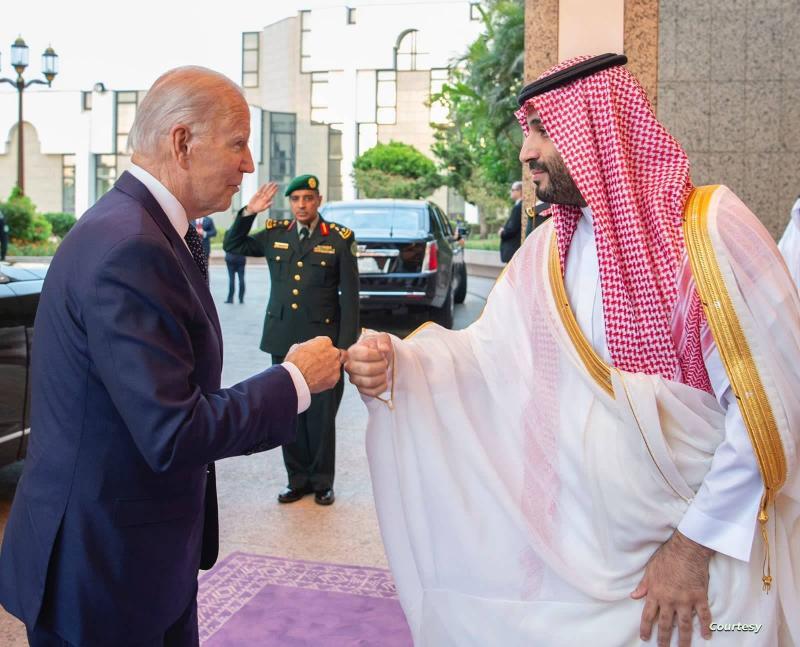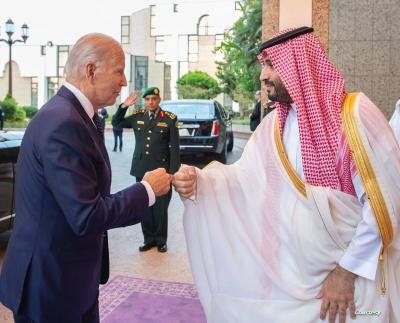In 2023, the Kingdom of Saudi Arabia witnessed a high-level regional and international political and diplomatic presence. The kingdom hosted numerous regional and international summits and meetings to discuss various crises and challenges around the world. Observers considered this a dawn of a new era in Saudi geopolitical vision, as Riyadh adeptly dealt with multiple crises in the region and globally. At the beginning of the year, Saudi Arabia evacuated thousands of civilians and diplomats due to the sudden outbreak of the Sudanese crisis in April.
In March, Saudi Arabia and the Islamic Republic of Iran unexpectedly announced the resumption of diplomatic relations and the reopening of their embassies under Chinese auspices. The kingdom hosted important international summits and meetings in the remaining months of the year, including four summits in July: a Saudi-Japanese summit, a Saudi-Turkish summit in Jeddah, followed by a consultative Gulf summit, and a Gulf summit with the five Central Asian countries (C5).
In August, Saudi Arabia held a meeting in Jeddah regarding the Ukrainian crisis with the attendance of national security advisers from nearly 40 countries. Then in October, it hosted a historic summit, the first between the Gulf Cooperation Council and the ASEAN. In response to developments in Palestinian territories, an extraordinary Arab-Islamic summit was convened in Riyadh in November to halt the Israeli aggression on Gaza, along with a Saudi-African summit. The year concluded with a Saudi-Russian summit following Russian President Vladimir Putin's visit to Riyadh.
### Resumption of Saudi-Iranian Relations
On March 10, Saudi Arabia and Iran announced the resumption of diplomatic relations and the reopening of their embassies within 60 days after talks facilitated by China. A joint tripartite statement emphasized the countries' respect for state sovereignty and non-interference in internal affairs. The embassies reopened officially, and Iranian President Ibrahim Raisi visited Saudi Arabia for the first time since the resumption of relations to attend the extraordinary Arab-Islamic summit regarding Gaza in November.
### Saudi Evacuation Efforts
Following the sudden escalation of the situation in Sudan in April, Saudi Arabia deployed its naval fleet in a widely praised initiative. The Saudi Foreign Ministry announced the evacuation of over 5,000 individuals from 100 countries, including 184 Saudis, since the outbreak of clashes between the Sudanese army and the Rapid Support Forces in mid-April, which was described as one of the largest and most successful evacuation operations globally.
### Gulf and Central Asia Summit
As part of continued strategic and political dialogue, Jeddah (western Saudi Arabia) hosted a summit in July for the leaders of the Gulf Cooperation Council and the five Central Asian countries (C5), emphasizing the importance of enhancing strategic dialogue and political partnerships across various fields, including political and security dialogue, economic and investment cooperation, and boosting people-to-people connections.
### Jeddah Meeting on the Ukrainian Crisis
In August, Jeddah hosted peace talks regarding the Ukrainian crisis, chaired by Dr. Musaed al-Iban, a member of the Cabinet and the Saudi National Security Advisor, with participation from national security advisers of about 30 countries.
### Gulf-ASEAN Summit
In October, a historic summit took place in Riyadh, marking the first meeting between the Gulf Cooperation Council and ASEAN, where leaders from 16 Gulf and Asian countries launched a joint action plan for 2024-2028 to enhance cooperation and partnership serving mutual interests.
### Saudi-African Summit
Continuing its active Saudi policy, Riyadh hosted a Saudi-African summit in November, where both sides emphasized developing cooperative and partnership relations and establishing foundations for continental integration for sustainable futures for both nations' peoples. Crown Prince Mohammed bin Salman announced the launch of the King Salman Development Initiative in Africa to initiate development projects worth over a billion dollars over ten years.
### Extraordinary Arab-Islamic Summit
Due to the grave situation following the Israeli aggression on Gaza, Saudi Arabia called for an extraordinary Arab-Islamic summit in November, attended by more than 57 countries, which resulted in exceptional decisions, including breaking the Israeli blockade on Gaza and emphasizing the need to halt its aggression.
### Summit with Caribbean Nations
The Saudi capital hosted a summit in November with Caribbean Community (CARICOM) countries aiming to enhance partnerships in various sectors such as economy, investment, trade, energy, and tourism in alignment with "Saudi Vision 2030." A joint Saudi-Caribbean statement emphasized mutual interests and friendly relations, discussing ways to expand and develop their partnership and collaboratives in education, health, maritime cooperation, communication, logistics, food security, energy security, tourism economy, and more.
### Saudi-Russian Summit
Before the end of 2023, Russian President Vladimir Putin conducted an important visit to Saudi Arabia, where he met Crown Prince Mohammed bin Salman for an extensive discussion on mutual interests and ongoing issues beneficial to both countries and the Middle East. Both Saudi Arabia and Russia stressed the need to cease military operations in the Palestinian territories, declaring that security and stability in Palestine could only be achieved through the implementation of international resolutions concerning the two-state solution. They expressed deep concern over the humanitarian catastrophe in Gaza and agreed to enhance defense and security cooperation.
In a joint statement, they agreed on increasing cooperation in the areas of oil and gas and highlighted the necessity for all participating countries to adhere to the OPEC agreement to serve the interests of producers and consumers and support global economic growth, praising the close cooperation between their countries and the successful efforts of OPEC countries to stabilize global oil markets.




